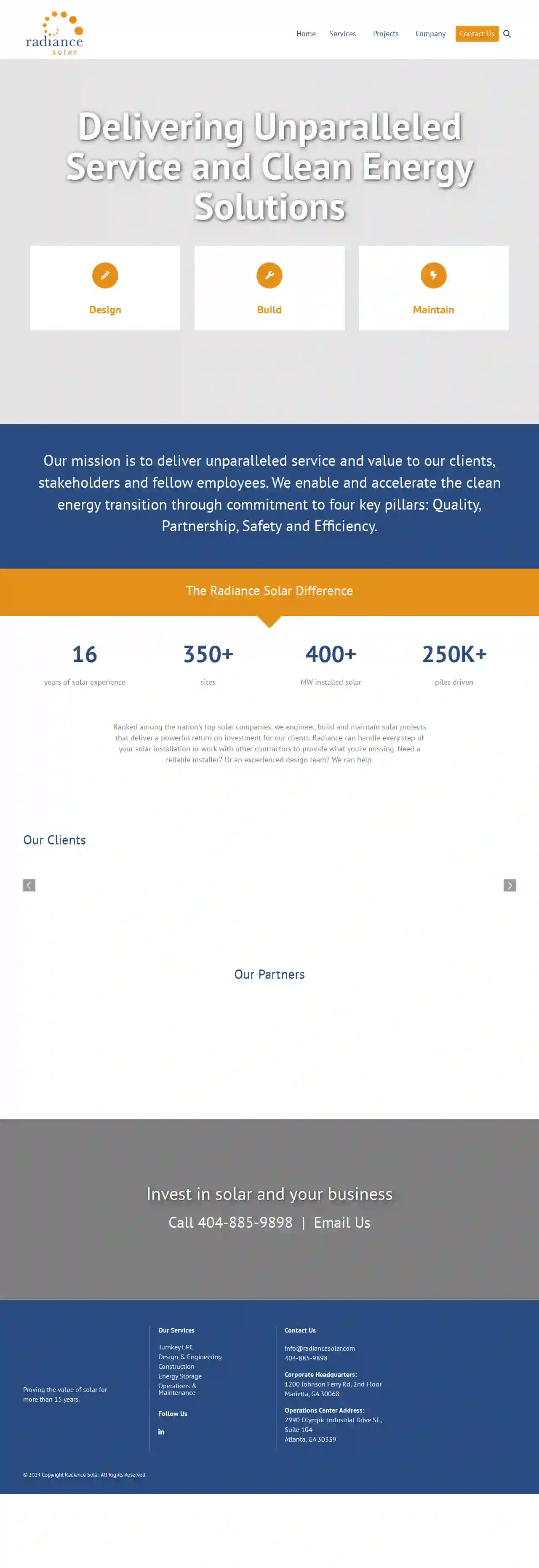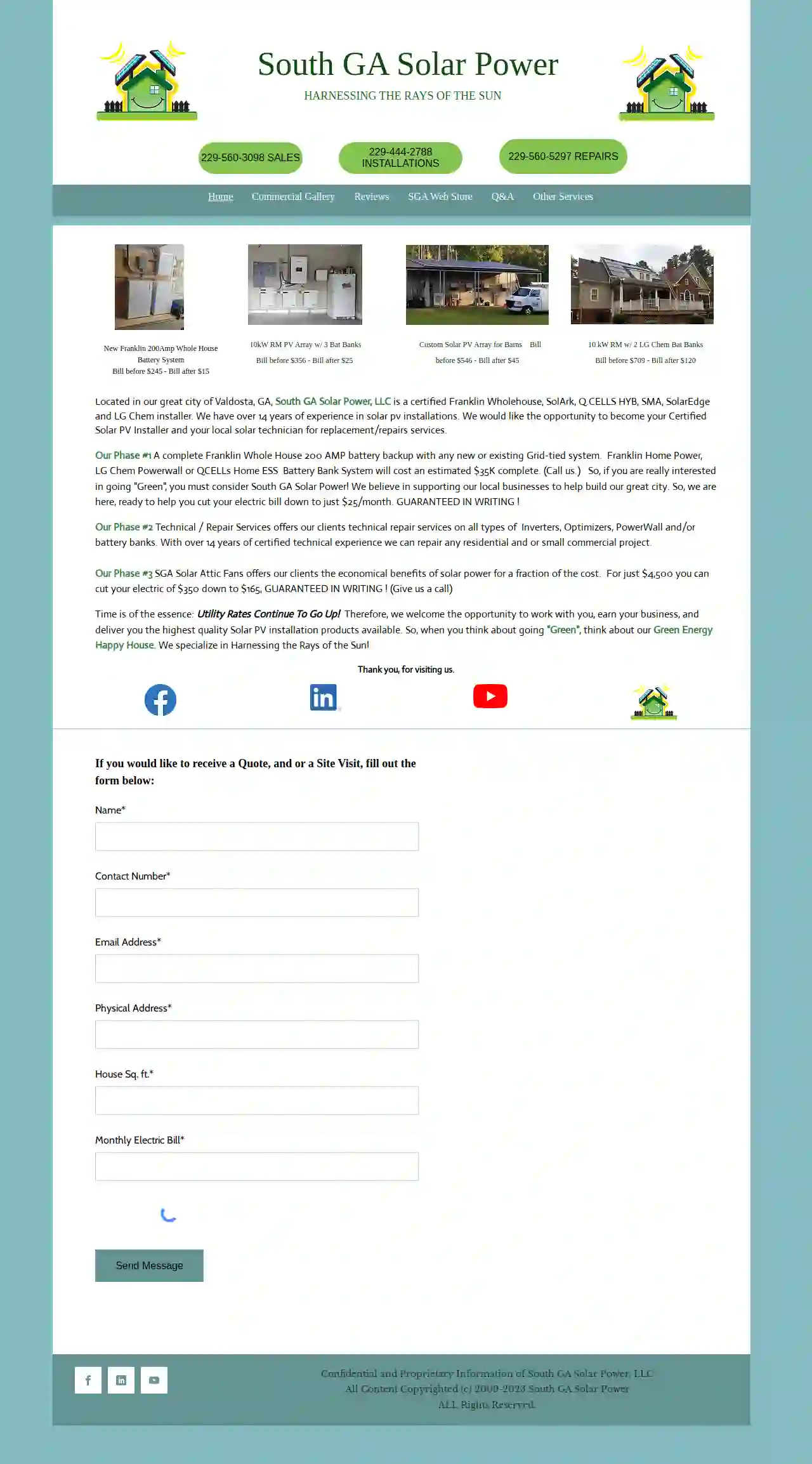Commercial Solar Installers Savannah
Best Commercial Solar Panel Installation in Savannah
Receive up to 3 Solar for Businesses quotes for your project today! Compare profiles, reviews, accreditations, portfolio, etc... and choose the best deal.

Solar Tyme USA, LLC
11 reviewsColumbus, GA, Suite 206, 416 12th St, 31901, USSolar Tyme USA, LLC is a female minority owned Columbus, GA based solar installation firm. We provide value by assisting our client's ability to hedge against inflationary facts via solar energy, energy efficiency upgrades, and energy audits. We assist homeowners, collective communities, and businesses by solving energy-burdensome challenges. Knowledge is power and empowering our customer base through education assists them to make one of the most important decisions of their lives.
- Services
- Why Us?
- Accreditations
- Our Team
- Testimonials
- Gallery
Get Quote
Solar Plus LLC
3.97 reviews715 Peachtree St. NE Suite 100, Atlanta, GA 30308, 30308, USSolar Plus is a full-service solar company serving Atlanta, Charlotte, Greenville, Columbia and beyond. The key to our success is that company president Don Tonic actively directs all solar projects, and is dedicated to the hiring, training, and retention of quality installation experts. The entire Solar Plus team is dedicated to delivering a quality solar electric system on every project.
- Services
- Why Us?
- Accreditations
- Our Team
- Gallery
Get Quote
Alternative Energy Southeast, Inc.
4.853 reviewsAthens, GA, 160 Collins Industrial Blvd, 30601, USAlternative Energy Southeast, Inc. is a team of Georgia solar professionals on the leading edge of our trade. We go above and beyond to ensure our residential, commercial & industrial, and government customers are treated with genuine integrity and their expectations are exceeded in every respect.
- Services
- Why Us?
- Accreditations
- Our Team
- Testimonials
- Gallery
Get Quote
Savannah Solar Power
55 reviewsSavannah, GA, 123 Solar Way, 31401, USSavannah Solar Power is a local business dedicated to providing sustainable solar power solutions to homes and businesses. They offer a range of services including solar panel installation, energy savings reports, and solar power plans. Their mission is to help customers reduce their carbon footprint and save money on their energy bills. They provide a 30-year warranty on their services and offer a $0 deductible.
- Services
- Why Us?
- Accreditations
- Our Team
- Testimonials
- Gallery
Get Quote
Creative Solar USA
4.482 reviewsKennesaw, GA, All mail sent here, P.O. Box 1077, 30156, USCreative Solar USA is a Georgia-based, turn-key installer of innovative solar panel systems for residential homes and commercial buildings. Our NABCEP Certified Installers ensure our clients receive the highest quality solar energy systems in the industry and remain committed to clients long after the installation is complete. We don't just build PV systems for our clients – we build relationships.
- Services
- Why Us?
- Accreditations
- Our Team
- Testimonials
- Gallery
Get Quote
Radiance Solar
4.19 reviews1200 Johnson Ferry Rd, 2nd Floor, Marietta, 30068, USRadiance Solar is a leading solar company with over 16 years of experience in the solar industry. They offer a range of services including turnkey EPC, design and engineering, construction, energy storage, and operations and maintenance. Their mission is to deliver unparalleled service and value to their clients, stakeholders, and fellow employees, enabling and accelerating the clean energy transition through commitment to four key pillars: Quality, Partnership, Safety, and Efficiency.
- Services
- Why Us?
- Accreditations
- Our Team
- Testimonials
- Gallery
Get Quote
South GA Solar Power
55 reviews123 Main St, Valdosta, 31601, USSouth GA Solar Power, LLC is a certified solar installer located in Valdosta, GA. They specialize in harnessing the rays of the sun to provide green energy solutions to their clients. With over 14 years of experience in solar PV installations, they offer a range of services including technical repair services, solar attic fans, and battery backup systems. Their mission is to help clients reduce their utility bills and support local businesses.
- Services
- Why Us?
- Accreditations
- Our Team
- Testimonials
- Gallery
Get Quote
Georgia Solar Pros
4.933 reviews1775 Pine Park Rd, Cairo, 39828, USGeorgia Solar Pros is a locally owned and operated solar company based in Cairo, near Thomasville, GA. We bring nearly 20 years of construction, roofing, and electrical contracting experience to members of our community looking to go solar. We work with residential and commercial clients and pride ourselves on delivering the highest quality, affordable solar solutions.
- Services
- Why Us?
- Our Team
- Gallery
Get Quote
Better Tomorrow Solar
4.825 reviews1074 Memorial Dr SE, Atlanta, 30316, USBetter Tomorrow Solar is a leading provider of solar energy solutions in Atlanta, GA. We offer affordable solar panel installation and solar battery storage solutions to help you save on your energy bills. Our team is dedicated to making solar energy accessible for all, providing a comprehensive service that includes consultation, design, permitting, and installation. With a focus on sustainability and customer satisfaction, we aim to provide the best solar energy solutions in Georgia.
- Services
- Why Us?
- Accreditations
- Our Team
- Testimonials
- Gallery
Get Quote
Simply Energy
52 reviewsSuite 100, 123 Solar Way, Elk Grove Village, 60007, USSimply Energy is a solar energy company that aims to provide clean, renewable, and earth-friendly solar energy solutions to businesses and homeowners. They offer a range of services including residential and commercial solar installations, off-grid consulting, and EPC (Engineering, Procurement, and Construction) services. Their mission is to help individuals and businesses reduce their living costs, own their power, and contribute to a cleaner environment.
- Services
- Why Us?
- Accreditations
- Our Team
- Testimonials
- Gallery
Get Quote
Over 4,210+ Solar Contractors on our directory
Our solar contractors operate in Savannah & surroundings!
SolarCompaniesHub has curated and vetted the Best Solar Contractors arround Savannah. Find a top & reliable contractor today.
Frequently Asked Questions About Commercial Solar Installations
- Location: Areas with high dust, pollution, or bird activity may require more frequent cleaning.
- Panel Angle: Flat or low-sloped panels tend to accumulate more dirt than steeper panels.
- Rainfall: Areas with regular rainfall may need less cleaning, as rain can help wash away some debris.
- Site Assessment and Consultation: A qualified Commercial Solar Installers will visit your property to assess your energy needs, roof or ground suitability, and discuss your project goals.
- System Design and Proposal: The installer will design a solar system that meets your requirements and provides a detailed proposal outlining the system size, cost, expected energy production, and financial incentives.
- Financing and Incentives: Explore financing options, such as solar loans, leases, or PPAs, and identify applicable tax credits or rebates to make your project more affordable.
- Permitting and Approvals: The installer will obtain necessary permits and approvals from your local building department and utility company.
- Installation: The solar panels, inverters, wiring, and other components will be installed according to the approved design.
- Interconnection and Commissioning: The system will be connected to the grid, and the utility company will conduct final inspections and activate your system.
- Monitoring and Maintenance: Your solar system will typically be monitored remotely for performance. The installer or a maintenance provider will handle any necessary maintenance or repairs.
- Use a Directory Like SolarCompaniesHub: We specialize in connecting businesses with qualified Commercial Solar Installers.
- Ask for Referrals: Get recommendations from other businesses that have gone solar.
- Check Online Reviews: Research installers on Google, Yelp, and other review sites.
- Verify Credentials: Make sure the installer is licensed, insured, and certified (e.g., NABCEP in the US).
- Get Multiple Quotes: Compare quotes from at least 3-4 installers, evaluating their experience, warranties, and proposed system design.
- Ask Questions: Don't hesitate to ask about their project management process, experience with similar projects, and safety protocols.
- Full Retail Net Metering: The most favorable policy, where you receive full retail credit for excess solar energy sent to the grid. This means you get the same price for the electricity you sell back as you pay for the electricity you buy from the utility.
- Time-of-Use (TOU) Net Metering: The value of the credits you earn varies depending on the time of day you export electricity to the grid. Higher credits are typically offered during peak demand periods.
- Net Billing: You receive a lower rate for excess solar energy than the retail rate you pay for electricity.
- Feed-in Tariffs (FITs): A separate meter is used to measure the solar energy you export to the grid, and you are paid a fixed rate per kilowatt-hour for this energy, which may be different from the retail electricity rate.
Do commercial solar panels require regular cleaning?
What is the process for installing a commercial solar system?
How do I find a reliable commercial solar installer?
Are there different types of net metering policies?
Do commercial solar panels require regular cleaning?
- Location: Areas with high dust, pollution, or bird activity may require more frequent cleaning.
- Panel Angle: Flat or low-sloped panels tend to accumulate more dirt than steeper panels.
- Rainfall: Areas with regular rainfall may need less cleaning, as rain can help wash away some debris.
What is the process for installing a commercial solar system?
- Site Assessment and Consultation: A qualified Commercial Solar Installers will visit your property to assess your energy needs, roof or ground suitability, and discuss your project goals.
- System Design and Proposal: The installer will design a solar system that meets your requirements and provides a detailed proposal outlining the system size, cost, expected energy production, and financial incentives.
- Financing and Incentives: Explore financing options, such as solar loans, leases, or PPAs, and identify applicable tax credits or rebates to make your project more affordable.
- Permitting and Approvals: The installer will obtain necessary permits and approvals from your local building department and utility company.
- Installation: The solar panels, inverters, wiring, and other components will be installed according to the approved design.
- Interconnection and Commissioning: The system will be connected to the grid, and the utility company will conduct final inspections and activate your system.
- Monitoring and Maintenance: Your solar system will typically be monitored remotely for performance. The installer or a maintenance provider will handle any necessary maintenance or repairs.
How do I find a reliable commercial solar installer?
- Use a Directory Like SolarCompaniesHub: We specialize in connecting businesses with qualified Commercial Solar Installers.
- Ask for Referrals: Get recommendations from other businesses that have gone solar.
- Check Online Reviews: Research installers on Google, Yelp, and other review sites.
- Verify Credentials: Make sure the installer is licensed, insured, and certified (e.g., NABCEP in the US).
- Get Multiple Quotes: Compare quotes from at least 3-4 installers, evaluating their experience, warranties, and proposed system design.
- Ask Questions: Don't hesitate to ask about their project management process, experience with similar projects, and safety protocols.
Are there different types of net metering policies?
- Full Retail Net Metering: The most favorable policy, where you receive full retail credit for excess solar energy sent to the grid. This means you get the same price for the electricity you sell back as you pay for the electricity you buy from the utility.
- Time-of-Use (TOU) Net Metering: The value of the credits you earn varies depending on the time of day you export electricity to the grid. Higher credits are typically offered during peak demand periods.
- Net Billing: You receive a lower rate for excess solar energy than the retail rate you pay for electricity.
- Feed-in Tariffs (FITs): A separate meter is used to measure the solar energy you export to the grid, and you are paid a fixed rate per kilowatt-hour for this energy, which may be different from the retail electricity rate.
